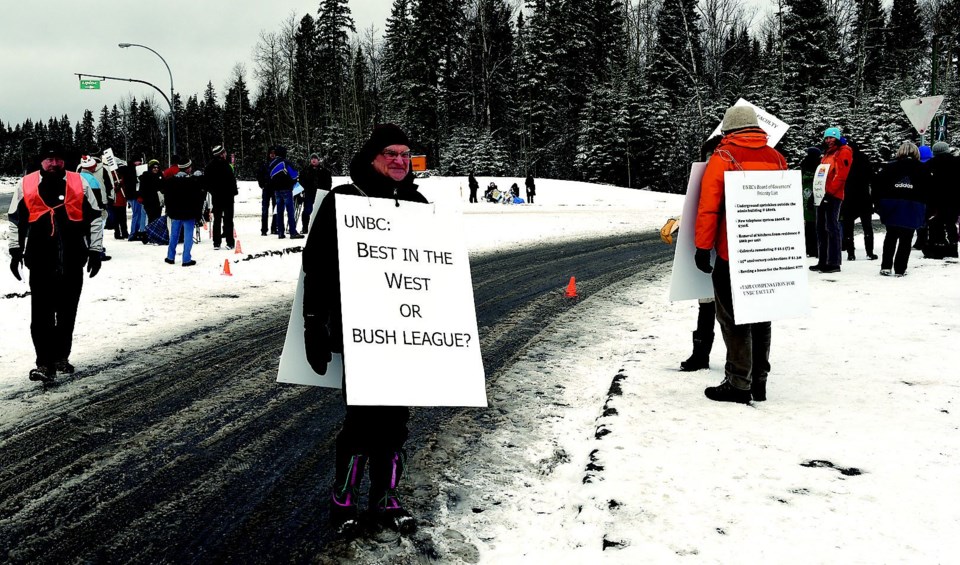The past year has been one of upheaval for UNBC, marked mostly by a faculty dispute with university administration that stretched back to the start of the 2015 calendar.
Even as UNBC celebrated its 25th anniversary, a first spot atop Maclean's magazine's university rankings for its size and two separate studies that showed strong alumni satisfaction, it faced off against a faculty association that argued those accolades would disappear if their comparatively low pay remained a reality.
The first rumblings of a strike started in January when faculty voted in favour of a strike mandate. But, the signs of a contract dispute stretched as far back to April 2014 when faculty voted to unionize and the February before that when arbitrator Vince Ready filed a report that seemed to side with many of faculty's concerns.
Reaching a first collective agreement only came through binding arbitration in mid-December that ordered a 10 per cent wage increase, at a cost of $5.6 million over the five-year contract, of which about $600,000 is over and above the province's economic stability mandate, said acting vice-president, academic Dan Ryan.
In the month before, faculty also fought with the Board of Governors over its appointment of former Conservative MP James Moore, who will take the the chancellor post this coming May. The faculty association argued that Moore is a bad pick and "closely associated with many anti-progressive policies that negatively impact the operations of Canadian universities."
Those sentiments were echoed by more than 2,000 online petitioners including alumni and students calling on the board to reverse its decision. Board chair Ryan Matheson repeatedly stood behind the choice of Moore, calling him "a true example of the leadership quality that the institution can develop and instill in people and have their careers be leveraged by going to UNBC."
The university is also currently undergoing a strategic academic planning initiative.
Since new president Daniel Weeks started in September 2014, there has been high turnover of its top administrators: Vice President of Research Ranjana Bird exited before the fall semester started and has yet to be replaced as Geoff Payne takes up an interim spot; Barb Daigle in May became Interim Vice President Administration and Finance, taking over for Eileen Bray.
Also in May William Krane was appointed vice-president, academic, and provost, but in December Dan Ryan took the acting position. Vice President of External Relations Rob van Adrichem departed in September to work for the City of Prince George and has yet to be replaced.
But it was the years-long feud with faculty over an acknowledged compensation gap that made front page news several months of the year. The Canada Winter Games offered a brief two-week hiatus in February after an agreed truce kept staff off the streets and saved the closing ceremonies scheduled for UNBC's agora courtyard.
Days after Prince George's largest sports festival ended, faculty took to the picket lines. During that time students staged a sit-in to bolster faltering talks between the two sides and organized a rally at the Civic Centre focused on provincial funding of post-secondary education.
In the end, after two weeks off classes, the university invoked a rare procedure under B.C.'s Labour Relations Board Code only available during first collective agreements. After meeting for one day, the Labour Relations Board mediator determined the sides were too far apart and ordered binding arbitration.
That was in April. It took months to schedule the late November meeting with arbitrator Stan Lanyon, who ultimately opted for an extra 0.5 per cent on top of the 9.5 wage increase the university had already agreed to. He also ordered the sides to start up a committee to addressed the continued compensation gap.
Ryan called the decision a compromise and a way for the university to move forward and "build positive, constructive relationships."
But for much of the year it was business-as-usual for the institution when it came to achieving funding partnerships, prestigious awards and accolades for the university and its members:
In January, the university marked the tenth year it has offered medical education through the Northern Medical Program, which is part of the Faculty of Medicine at the University of British Columbia. Since 2008, it has graduated seven classes of between 24 and 32 students.
A UNBC student initiative called Pave the Way raised $37,000 to cover the cost of public transit during the Canada Winter Games in February
In June, UNBC researchers were awarded a combined $436,000 for professors in the areas of medical research, ecosystem science and management and computer science through the Natural Sciences and Engineering Research Council of Canada (NSERC) grants and scholarship programs. The body also awarded UNBC students $52,500 for scholarships and fellowships.
That same month the university helped open the new $10.5 million Learning and Development Centre. The 14,693 square-foot space, housed at the University Hospital of Northern B.C. has a library, seminar rooms, a clinical simulation centre, video conferencing suites and was first used by Northern Medical Program in the fall.
As well as dubbing itself Canada's Green University, the university earned the Fair Trade Campus designation. For the fourth year in a row, it was named one of Canada's Greenest Employers.
Biochemistry student Faran Rashid earned one of five $10,000 scholarships from the Brain Tumour Foundation. UNBC environmental engineering students were a part of a team that won first place at an international student design competition. Some of those students also got top spot in a provincial water and waste competition.
The university, the student society and as student group said in September they would pay for five Syrian refugees' sponsorship and education.



